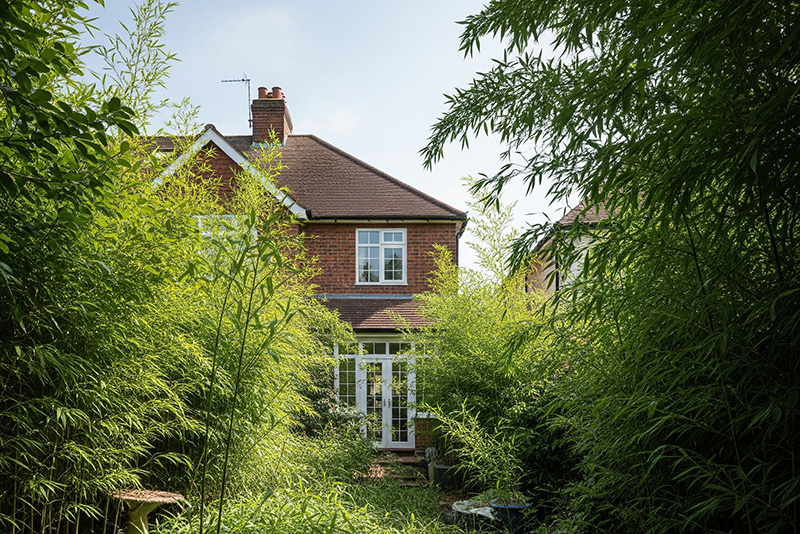While often admired for its exotic appeal and rapid growth, certain species of bamboo pose a significant, often underestimated, threat to properties across the UK. Far from being a benign ornamental plant, invasive “running” bamboo can cause extensive damage to structures and gardens, leading to costly repairs and even impacting property value. As chartered building surveyors, Able Surveyors are increasingly encountering the destructive capabilities of this plant, and it’s crucial for prospective property owners to be aware.
Understanding the Threat: How Bamboo Causes Damage
The danger of invasive bamboo lies primarily in its aggressive, fast-spreading underground root system, known as rhizomes. Unlike “clumping” bamboo varieties that stay in a confined area, running bamboo sends out long, strong rhizomes that can travel many metres horizontally, often undetected beneath the soil.
These rhizomes are incredibly potent. As they grow and expand, they can:
- Damage Foundations and Structures: Bamboo rhizomes are strong enough to exploit and penetrate tiny cracks or weaknesses in building materials, including concrete foundations, cavity walls, and drainage systems. This relentless pressure can lead to structural instability, cracks in walls, and costly repairs.
- Lift Paving and Hard Landscaping: Driveways, patios, paths, and even garden walls are vulnerable. The expanding rhizomes can grow beneath these surfaces, causing them to lift, crack, and become uneven, posing trip hazards and requiring extensive reinstatement work.
- Infiltrate Drainage Systems: The roots can find their way into pipes, leading to blockages and breaks in plumbing systems, which can be expensive and disruptive to rectify.
- Encroach on Neighbouring Properties: Bamboo’s rapid spread often extends beyond property boundaries, leading to disputes with neighbours and potential legal action for nuisance and damage caused.
The Hidden Cost of Invasive Bamboo
The financial implications of bamboo infestation can be substantial. Beyond the immediate repair costs, which can range from hundreds to tens of thousands of pounds depending on the severity, the presence of invasive bamboo can also:
- Devalue a Property: Awareness of bamboo’s destructive nature is growing among homebuyers. Properties with unmanaged bamboo can see a significant reduction in market value, with potential buyers being deterred by the risk of future damage and removal costs.
- Impact Mortgage Applications: While not currently subject to the same strict legal declarations as Japanese Knotweed, mortgage lenders are becoming increasingly cautious about properties with extensive bamboo issues.
- Lead to Legal Disputes: As bamboo spreads into adjacent properties, it can become a legal nuisance, potentially leading to costly and time-consuming neighbour disputes and legal action.
What to Look for: A Surveyor’s Perspective
When Able Surveyors conduct a property survey, especially for properties with established gardens or those in areas where bamboo is prevalent, we pay close attention to signs of its presence and potential invasiveness. While a full specialist invasive plant survey may be recommended in severe cases, our standard building surveys will look for:
- Visible Bamboo Growth: Identify the type of bamboo – “running” varieties are the main concern. Note its proximity to the property’s foundations, outbuildings, and boundaries.
- New Shoots: Look for new bamboo shoots emerging in unexpected places, far from the main plant. This is a clear indicator of underground rhizome spread.
- Damage to Hard Surfaces: Inspect driveways, patios, paths, and walls for cracks, lifts, or unevenness, which could signal rhizome activity beneath the surface.
- Fencing and Boundary Walls: Check for any signs of bamboo growing through or pushing against boundary structures.
- Evidence of Containment: If bamboo is present, look for professional-grade root barriers (typically deep, thick impermeable membranes) and assess their effectiveness and integrity. A barrier that is too shallow or damaged will not prevent spread.
- Neighbouring Properties: Observe if bamboo from adjacent gardens appears to be encroaching.
Protecting Your Investment
If you are considering purchasing a property, particularly one with bamboo in the garden or nearby, it is vital to:
- Be Aware: Understand the risks associated with invasive bamboo.
- Ask Questions: If bamboo is present, inquire about its management and whether it is a “running” or “clumping” variety.
- Insist on a Thorough Survey: A comprehensive building survey from a chartered surveyor is your best defence. Able Surveyors can identify potential issues and advise on the next steps, including recommending specialist invasive plant reports if necessary.
- Consider Legal Advice: If bamboo from a neighbouring property is causing concern, seek legal guidance on your rights and options.
Don’t let the beauty of bamboo mask its potential for significant property damage. By being vigilant and employing the expertise of a chartered building surveyor, you can protect your prospective property from this silent invader.
For professional and comprehensive property surveys, contact Able Surveyors today.




